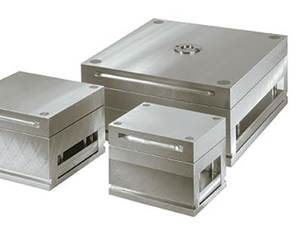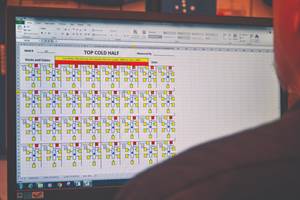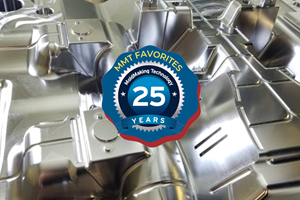Setting Up Shop in Mexico
Moldmakers and suppliers weigh in on the pros and cons of establishing satellite operations south of the border.
Attendees of last December's trade mission to the Maquiladora region - sponsored by the The Society of the Plastics Industry (SPI) (Washington, D.C.) - learned firsthand about business opportunities that can be found around the Mexico/U.S. border from manufacturers, suppliers and business development experts who have successfully established facilities in this area.
The fact that Mexico is so close to home should be reason enough to consider the possibility of establishing operations in Mexico itself, on the U.S./Mexican border, or setting up twin plants, which is becoming increasingly popular. One plant would be on each side of the border to take advantage of Mexico's lower labor costs and the United States' technology and resources. In addition, you could establish a foreign trade zone, which allows you to set up a facility located within the U.S. that is considered outside of U.S. customs territory (see table at end of article).
No matter which way you choose to be closer to your customers, you will have the ability to serve them more efficiently. However, it is not an easy endeavor - you must be prepared to invest a great deal of time and money in addition to learning the business practices and customs of another country.
Supplier Side
Delphi Automotive Systems (Troy, MI) - a manufacturer of mobile electronics and transportation components and systems technology - continues to follow and support its customers in 43 countries. Reynosa, Mexico is another example of the advancement, technology and employee skills for Delphi. According to Director of Communications Michael Hissam, the company has six plants in Reynosa with 82 injection presses that produce 10 million parts per month. With 65,000 employees in Mexico, Delphi is one of that country's largest private employers.
"More and more auto manufacturers are moving to Mexico. If you look at our plants across North America, you will see that they are strategically placed to service our customers in the U.S., Canada and Mexico. It also is significant that with the higher technology and success in Mexico, we also are building a customer base on other continents," he states. "Mexico has an eager, dynamic workforce that is very enthusiastic and customer-focused."
Delphi was just one of many facilities that opened its doors during SPI's trade mission. Over at Black & Decker de Reynosa, Jim Hollifield - strategic unit manager for plastic molding - fielded questions from attendees on what it was like setting up initial operations and what kind of infrastructure and support was available. "It is different in Mexico," Hollifield concedes. "All of our operations in the United States follow a similar format. Cultural differences and legal matters are challenging in Mexico and make things a bit different." For anyone interested in establishing operations in the Maquiladora area, Hollifield recommends contacting the McAllen Economic Development Corporation (MEDC) - a not-for-profit corporation under contract with the city of McAllen to create jobs for the city by attracting new industry and helping existing companies to expand. At no charge, the company's staff will set up itineraries for companies interested in learning more about the area. "We take them to other moldmakers or OEMs related to their business," states Nancy Boultinghouse, MEDC marketing director. "We also can physically take anyone across the border to see any Maquiladora plants."
Then, the MEDC will continue walking interested parties through the process of establishing operations on the U.S./Mexico border. "We really help companies understand the ins and outs of doing business in this region," she adds. "Maquiladora growth here over the past several years has been phenomenal - at one point last year McAllen was the fastest growing city in the U.S.," Hollifield comments. "The MEDC has contacts on both sides of the border. The advantage to being on this side of the border is that you can produce to demand and you don't have to go through the import rigors of bringing material across - it's an 'inside Mexico' transfer, which is a lot less of a hassle."
After contacting the MEDC, Hollifield recommends reviewing your pro forma with them, and then planning to attend the Reynosa Maquiladora meetings that are held the first Wednesday of each month at Cimarron Country Club in Mission, TX, which is adjacent to McAllen.
"I would introduce myself there because the general managers of the Maquiladoras attend those meetings," he says. "Most of these people either have internal molding facilities or external molding support. Then you can get a feel for what the need would be in that general area. From there I would make an assessment of where to locate and what basic services are required. We use local sourcing for tooling support. We do have an internal tool shop, but there are a lot of things we are not equipped to do yet. To my knowledge, there are only a couple of mold shops of any notoriety in McAllen."
Michail Samodouroff, director of Mexico sourcing for Black & Decker, echoes this sentiment. "There is a desperate need for toolmakers here in Mexico, but at the same time there are very few skilled people here, so a lot of training and development needs to be done," he notes. "Also, there's a huge amount of competition from Asia. To find sources down here, you have to remember that it's a different country, and just because it's along our border does not mean that the same rules apply.
"For example, we are working with the Mexican Small Business Administration - utilizing them as a go-between between the raw material suppliers and the actual producers to help them facilitate programs," Samodouroff continues. "They are all looking to make money, but neither party has a real view of what their competition is. You have to work several different channels and a lot of it is relationship-based. You also can use the government as a resource. Also, a lot of it is networking - calling up people in the Maquiladoras and working through the system that way."
He adds to seek out the "big guys" - the Chryslers, the GEs, Fords, General Motors, LGs - and establish relationships with them. "More than anything else, like real estate, it's location, location, location!" he states. "Start with the big ones and hook up with other companies from there. Moldmakers need to understand their customers and find out where decisions are being made before they can solicit support with the Mexican government and the MEDC for their operations."
Attendee View
Mike Zacharias, president of Extreme Tool & Engineering (Ironwood, MI) - a moldmaker specializing in plastic injection molds - came away from the mission believing that there is a "ton of opportunity" in Mexico and the Maquiladora region.
"While everyone we spoke with was careful to indicate the challenges of doing business in this region, most were very positive about the growth opportunities there," Zacharias says. "I went on this trade mission to evaluate the need for fast delivery/high quality injection moldmaking, and left with the feeling that there is a need there that isn't being met. Most molders in the region buy and repair tooling from sources a great distance from their location."
Fact-finding was on Rick Finnie's mind. President of Brea, CA-based M.R. Mold & Engineering - a provider of tooling for the rubber and plastics industries - Finnie wanted to see if any opportunities existed for his company. "Before I left, I seriously considered the possibility of opening a branch down there," he says, "so I wanted to learn all about the region, what type of molding is going on and what kind of customers existed. Afterwards, I had a change of heart. We have no contacts down there so we would be starting from scratch; and we are a smaller company, so I see no reason to set up another branch in Texas. When I returned to California I refocused on the things we excel in."
Extreme Tool & Engineering's Zacharias also left the trade mission full of knowledge and resolve for the future. "I am very interested in establishing a satellite operation for our facility in this region in the future," he says. "Our only limiting factor at this time is maintaining a reasonable growth plan and managing growth at our existing facility. I want to make sure that we are ready for our next facility before proceeding."
Zacharias believes that a facility on the U.S. side is more practical for numerous reasons - including economic and diplomatic factors. "The foreign trade zone on the U.S. side is a more practical goal than one in Mexico," he notes. "In my opinion, there is little to be gained by being 'in Mexico' versus five miles over the border in the U.S., and many things are easier here."
However, he applauds the efforts of the MEDC as well as technical colleges and universities in Texas for taking an aggressive approach to meeting the needs of employers in this region, with very job-specific training being developed and defined. "The people from the MEDC were very positive and their energy was contagious," he says. Additionally, Zacharias found that the costs of doing business in this region were "more reasonable" than many other metropolitan areas like Dallas, Minneapolis, Chicago and Boston.
"Although highly skilled personnel are not available everywhere, there's a surplus of people with a good work ethic who are trainable and looking for good employment opportunities," Zacharias says. "The facilities we visited were very high-tech, clean and modern. The personnel running them are as skilled and talented as those anywhere."
Finally, Zacharias realizes the importance of approaching business opportunities in Mexico with an open mind. "People down there are not interested in having our systems and processes imposed on them without an opportunity for input," he states. "The people who live and manufacture in this region have reason to be proud of what they are accomplishing and where they are doing it. I hope to join them in this effort at some point soon."
| What Is the Foreign Trade Zone? |
| For those moldmakers and molders thinking about establishing operations in and around Mexico, learning about the foreign trade zone will help you to make a more educated decision. The program - established in 1934 by Congress to promote trade and create jobs - involves using a restricted-access site in or adjacent to a Customs port of entry. It must be operated pursuant to public utility principles under the sponsorship of a corporation-granted authority by the Foreign Trade Zone (FTZ) Board and under the supervision of Customs Service.
According to Roy Knapp, Jr., president of Fairview Park, OH-based Consultech - a specialized consulting firm - zones are typically located in industrial parks, marine terminals, airports or warehouses, and can provide savings and flexibility to users involved in international trade. Benefits
|
Related Content
The Role of Social Media in Manufacturing
Charles Daniels CFO of Wepco Plastics shares insights on the role of social media in manufacturing, how to improve the “business” side of a small mold shop and continually developing culture.
Read MoreConsiderations for Mold Base Material Selection
Choosing the right material can greatly affect the profitability and cost of your application.
Read MoreWhat is Scientific Maintenance? Part 2
Part two of this three-part series explains specific data that toolrooms must collect, analyze and use to truly advance to a scientific maintenance culture where you can measure real data and drive decisions.
Read MoreLeading Mold Manufacturers Share Best Practices for Improving Efficiency
Precise Tooling Solutions, X-Cell Tool and Mold, M&M Tool and Mold, Ameritech Die & Mold, and Cavalier Tool & Manufacturing, sit down for a fast-paced Q&A focused on strategies for improving efficiencies across their operations.
Read MoreRead Next
How to Use Continuing Education to Remain Competitive in Moldmaking
Continued training helps moldmakers make tooling decisions and properly use the latest cutting tool to efficiently machine high-quality molds.
Read MoreAre You a Moldmaker Considering 3D Printing? Consider the 3D Printing Workshop at NPE2024
Presentations will cover 3D printing for mold tooling, material innovation, product development, bridge production and full-scale, high-volume additive manufacturing.
Read More






.jpg;maxWidth=300;quality=90)




.png;maxWidth=300;quality=90)




_300x250 4.png;maxWidth=300;quality=90)










